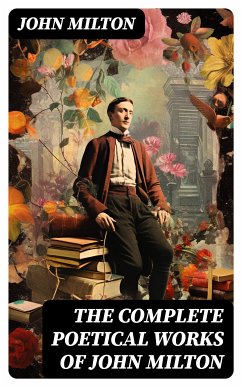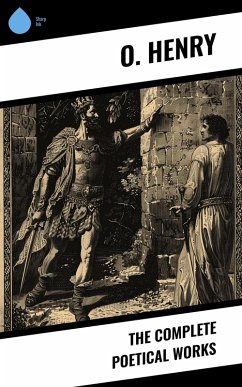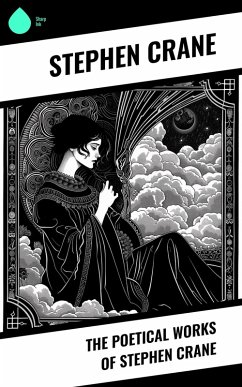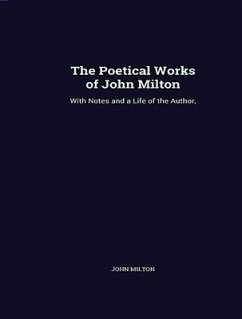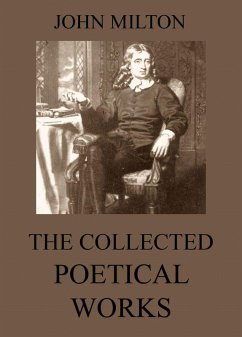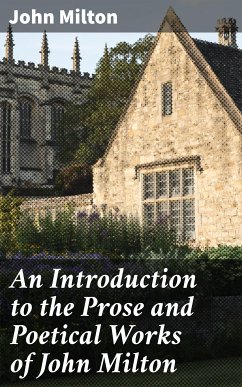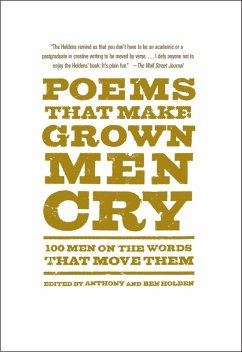
The Complete Poetical Works of John Milton (eBook, ePUB)
Paradise Lost, Paradise Regain'd, Samson Agonistes, Psalms, Sonnets, The Passion, on Time, on Shakespear, L'allegro, Il Penseroso, Arcades, Lycidas
Versandkostenfrei!
Sofort per Download lieferbar
0,99 €
inkl. MwSt.
Weitere Ausgaben:

PAYBACK Punkte
0 °P sammeln!
John Milton was a poet of many interests and he wrote on various topics, but he was the most famous for his poems on Christian themes. His poetic style was a highly influential poetic structure and his influence is largely grounded in his later poems: Paradise Lost, Paradise Regained, and Samson Agonistes. Contents: Introduction Paradise Lost Paradise Regain'd Samson Agonistes Of That Sort of Dramatic Poem Which Is Call'd Tragedy The Argument The Scene Before the Prison in Gaza On Time Miscellaneous Poems: On the Morning of Christs Nativity The Passion On Time Upon the Circumcision At a Solemn...
John Milton was a poet of many interests and he wrote on various topics, but he was the most famous for his poems on Christian themes. His poetic style was a highly influential poetic structure and his influence is largely grounded in his later poems: Paradise Lost, Paradise Regained, and Samson Agonistes. Contents: Introduction Paradise Lost Paradise Regain'd Samson Agonistes Of That Sort of Dramatic Poem Which Is Call'd Tragedy The Argument The Scene Before the Prison in Gaza On Time Miscellaneous Poems: On the Morning of Christs Nativity The Passion On Time Upon the Circumcision At a Solemn Musick An Epitaph on the Marchioness of Winchester Song on May Morning On Shakespear. 1630 On the University Carrier Who Sickn'd in the Time of His Vacancy, Being Forbid to Go to London, by Reason of the Plague Another on the Same L'allegro Il Penseroso Sonnets Arcades Lycidas A Mask Presented at Ludlow-castle, 1634. &c. On the Death of a Fair Infant Dying of a Cough At a Vacation Exercise in the Colledge The Fifth Ode of Horace. Lib. I. Sonnets: On the New Forcers of Conscience Under the Long Parliament On the Lord Gen. Fairfax at the Seige of Colchester To the Lord Generall Cromwell May 1652 To Sr Henry Vane the Younger To Mr. Cyriack Skinner Upon His Blindness. Psalms: Psal. I. Done Into Verse, 1653 Psal. II Done Aug. 8. 1653. Terzetti. Psal. III. Aug. 9. 1653 Psal. IV. Aug. 10.1653 Psal. V. Aug. 12.1653 Psal. VI Aug. 13. 1653 Psal. VII. Aug. 14. 1653 Psal. VIII. Aug. 14. 1653 Psal. LXX Psal. LXXXI Psal. LXXXII Psal. LXXXIV Psal LXXXV Psal. LXXXVI Psal. LXXXVII Psal. LXXXVIII Prose Writings: From of Reformation in England, 1641 From Reason of Church Government, 1641 From Apology for Smectymnuus, 1642 From Areopagitica, 1644 From Tetrachordon, 1645 From the Tenure of Kings and Magistrates, 1649 From History of Britain, 1670
Dieser Download kann aus rechtlichen Gründen nur mit Rechnungsadresse in A, B, BG, CY, CZ, D, DK, EW, E, FIN, F, GR, H, IRL, I, LT, L, LR, M, NL, PL, P, R, S, SLO, SK ausgeliefert werden.




